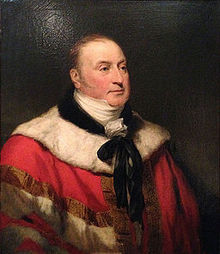George Capel-Coningsby, 5th Earl of Essex
|
The Right Honourable The Earl of Essex |
|
|---|---|

Portrait from the studio of Sir Thomas Lawrence of George Capel-Conningsby, Fifth Earl of Essex
|
|
| Earl of Essex | |
|
In office 1799–1839 |
|
| Monarch | George IV; William IV |
| Member of Parliament for Westminster 1779-80 |
|
| Member of Parliament for Lostwithiel 1781-84 |
|
| Member of Parliament for Okehampton 1785-90 |
|
| Member of Parliament for Radnor 1794-99 |
|
|
Lord Lieutenant of Herefordshire 1802-17 Recorder and High Steward of Leominster 1802 |
|
| Personal details | |
| Born |
13 November 1757 Watford, Hertfordshire |
| Died | 23 April 1839 Watford, Hertfordshire |
| Nationality | British |
| Known for | Commissioned the redesign of Cassiobury House |
George Capel-Coningsby, 5th Earl of Essex FSA (13 November 1757 – 23 April 1839) was an English aristocrat and politician, and styled Viscount Malden until 1799. His surname was Capell until 1781.
.
George Capell was the son and heir of William Anne Capell, 4th Earl of Essex (1732–1799), from his first marriage to Frances Williams. He was also the elder half-brother of Thomas Bladen Capel, Captain (later Admiral) in the Royal Navy and one of Horatio Nelson's Band of Brothers.
George Capell was educated at Corpus Christi College, Cambridge, receiving his MA in 1777. In 1781 he took the additional name of Coningsby on succeeding to the estates of his grandmother, Lady Francis Hanbury-Williams, née Coningsby.
He was one of the two members of parliament for Westminster from 1779 to 1780, a member for Lostwithiel from 1781 to 1784, for Okehampton from 1785 to 1790, and for Radnor from 1794 to 1799.
On 4 March 1799 Capel-Coningsby succeeded his father as 5th Earl of Essex. He served as Recorder and High Steward of Leominster in 1802, and as Lord Lieutenant of Herefordshire from 1802 to 1817. He became a Fellow of the Society of Antiquaries in 1801, and received an honorary D.C.L. from Oxford University in 1810.
...
Wikipedia
